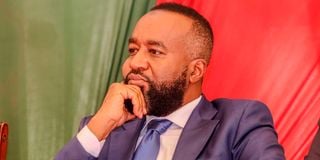
A company linked to the family of Mining, Blue Economy and Maritime Affairs Cabinet Secretary Hassan Joho will be paid Sh9 billion to relinquish its interest in a 79-acre piece of prime land off Nairobi’s Ngong Road on which the government is constructing the Talanta Sports Stadium.
The stadium, which is being built near the Jamhuri Showground along Ngong Road, is one of a number of facilities that Kenya is preparing to host the Africa Cup of Nations (Afcon) matches in 2027. The continental showcase will also include Uganda and Tanzania as co-hosts.
The stadium sits on a lucrative piece of land that is at the centre of an ownership battle between the government and Telkom Kenya, a State-controlled corporation. Telkom has contested that construction of the stadium began before the National Land Commission (NLC) completed the compulsory acquisition of the land from it.
The firm, which is partly owned by the State, moved to court in December 2021 seeking Sh15 billion in compensation for the prime piece of land, arguing that its appropriation by the government was depriving it of its right to the property.
The government owns a 40 per cent stake in the telco, and is actively involved in management of the firm. An attempt by former President Uhuru Kenyatta’s administration to buy out the privately-held 60 per cent stake in the company was reversed by President William Ruto last year.
Telkom’s claim for compensation over the Talanta Stadium land is tied at the hip with Aftraco Limited, a firm linked to CS Joho’s family. In 2011, Aftraco agreed to buy the land from Telkom for Sh1.52 billion and paid a deposit of Sh152 million, representing 10 per cent of the value of the land.
Telkom, however, cancelled the sale of the land to the Joho family-linked firm citing frustrations preventing it from completing the sale.
Aftraco was incorporated on August 4, 2009.
Business Registration Service (BRS) records show that Aftraco is owned by Salim Sadru (500 shares), Jane Jepkemboi Sumbeiywo (499 shares) and lawyer Hellen Alice Olwanda (one share).
The postal address Mr Salim declared as his in disclosures to the BRS for Aftraco is also used by Portside Freight Terminals.
Abubaker Ali Joho owns 75 shares in Portside, while Hussein Hamid Khamis owns 25 shares.
Mr Abubaker and Mr Salim are also shareholders and directors of Autoports Freight Terminals Ltd, another firm co-owned by the Joho family. They each hold 250 shares in Autoports. Khamis Hamid is also a co-owner of Autoports with 500 shares.
Autoports was incorporated on July 5, 2012. Documents from the BRS indicate that as of 2023, the firm had secured loans of $16.125 million (Sh2.084 billion) to fund its operations.
The timing of the loans indicate that the funds may have been channelled towards two big contracts the company bagged in 2021 – one from Kenya Railways to exclusively operate the Nairobi Inland Cargo Terminal and another from the Kenya Ports Authority to set up a grain bulk handling facility.
At Autoports, Mr Abubaker and Mr Salim share a postal address, but which is different from the one declared by the latter in other companies.
The postal address declared by Mr Abubaker and Mr Salim for Autoports is also used by Heartland Terminals Ltd.
Heartland Terminals was incorporated on August 9, 2021. Yusuf Abubaker Joho is listed as a director.
It is owned by two UAE-registered firms – Goldengate Ltd (175 shares) and Heartland Investments Ltd (175 shares) – alongside Superstorm Holdings Ltd (175 shares).
Superstorm Holdings was incorporated on July 3, 2017, and is wholly owned by Morris Agonya.
A 2023 case filed by Edna Muthoni Simba, a former employee of Portside Freight Terminal over unfair dismissal, gave a rare glimpse into the close links between the two families, and how thin the borders separating their businesses are.
An order by Portside’s director Hamid Sadru to slash Ms Simba’s pay from Sh135,948 to Sh79,246 was the starting point.
Court papers Ms Simba filed when suing for wrongful termination show that she reached out to two senior officials, director Abubaker Joho and CEO Salim Sadru, but that the two failed to resolve the impasse.
In the saga at Portside, Mr Abubaker and Mr Salim promised Ms Simba that they would talk to Hamid Sadru, the director who hired Ms Simba, to resolve the issue but nothing came of it.
The court papers show that Khamis Hamid, a director and shareholder of Autoports Freight, is the one that informed Ms Simba that she had been fired from Portside Freight.
Eventually, Ms Simba was awarded Sh961,654 in damages and dues after unlawful termination from Portside Freight.
To pursue compensation for the land, Telkom hired two valuers to undertake a market value assessment of the land.
One valuer, Gimco Limited, valued the land at Sh15.8 billion while another valuer, Mauna Consulting Limited, put the land’s value at Sh15.01 billion.
The valuations were done in 2021, implying that in just 10 years the land’s valuation had shot up by 10 times. Gimco attributed the increase in valuation to the high demand for land in the area owing to its strategic location near the busy Ngong Road and the leafy Karen suburb.
“The area enjoys easy access from all commercial districts within Nairobi and is within close proximity to middle-and-high-income residential neighbourhoods within Kilimani, Lavington and Karen,” said the valuers.
When Telkom moved to court, it successfully convinced the court to use this valuation.
“In this regard, the learned counsel for the 1st Petitioner (Telkom) has thus implored the court to use the valuation report and thereafter to decree and award to and in favour of the petitioner compensation in the said sum,” pleaded Telkom in the suit.
Aftraco, the firm linked to the Joho family, was named the second petitioner in the case. It supported Telkom’s compensation of Sh15 billion for the property.
“Be that as it may, learned counsel for the 2nd Petitioner has submitted that compulsory acquisition must follow the laid down process/procedure coupled with the due and prompt payment of just compensation,” it said.
Telkom Kenya Limited
In his judgement delivered in July last year, Justice Oguttu Mboya confirmed Telkom Kenya Limited as the owner of the land, ending the fierce battle for the ownership of the prime piece of land that had raged for more than 12 years.
The court also adopted the independent valuation of the land, which confirmed its value at Sh15 billion.
Telkom took the Ministry of Sports, Culture and Heritage and the NLC to court in 2021 seeking to be paid for land which the government is using to build the 60,000-capacity stadium.
The 79-acre piece of land was previously owned by Telkom’s predecessor, the Kenya Post and Telecommunication Corporation, but was transferred to Telkom in 1998 after the corporation was dissolved.
Before the corporation was dissolved, it had in 1993 sold 60 acres of the land to Postel Housing Co-operative Society Limited. However, the High Court last year found that the sale of 60 acres to Postel did not materialise, which leaves Telkom as the rightful owner of the whole property.
“There is no gainsaying that the 1st Petitioner (Telkom) therefore has the lawful rights to deal with the suit property, for as long as the certificate of title has not been vitiated, negated and/or otherwise revoked,” ruled Justice Mboya.
When making the judgment, Justice Mboya also deliberated on the question of whether it is feasible for Telkom to continue holding the title to the land when the Ministry of Sports has already built a stadium on it.
He therefore ordered that Telkom surrender the title of the land to the NLC so that it is issued to the Ministry of Sports, and for Telkom to be compensated.
“In any event, in default to comply, the Chief Land Registrar would still be at liberty to cancel the certificate of title, given the extent of developments that have already been undertaken thereon, using public resources,” stated Justice Mboya.
Should the NLC pay Telkom Sh15 billion for the land, Mr Joho’s firm stands to get Sh9 billion on the basis of a deal it signed with Telkom.
In 2018, Telkom and Aftraco entered into a deal to share the land or compensation for the land. In the agreement, Telkom would retain 31.6 acres, which is 40 per cent of the land, while Aftraco would get 47.4 acres, which is 60 per cent of the land.
The two parties do not elaborate how they settled on this formula to divide the property, considering that by the time the sale was cancelled, the Joho-linked firm had only paid 10 per cent of the land’s valuation then.
In addition, the two companies agreed to extend the lease of the land and change its use to a mixed commercial and residential property. The deal gave Aftraco 60 per cent of the proceeds should the land be compulsorily acquired by NLC on behalf of the government, which is already building the Talanta stadium on it.
“In the event that the proposed compulsory acquisition by the NLC proceeds to completion, the parties agree that the compensation proceeds paid by the NLC shall be distributed to the parties in the proportions of 40:60 percent to Telkom and Aftraco respectively with all other relevant obligations as set out in this deed remaining in full force and effect,” says the Deed.
Telkom’s lawyers have in addition slapped the company with a bill of Sh901.11 million for defending it in the case.
CS Joho is one of a handful of opposition figures allied to former Prime Minister Raila Odinga that President William Ruto appointed to his Cabinet in August as part of the “broad-based government” meant to quell the Gen Z-led protests.
The others are Cabinet secretaries Opiyo Wandayi (Energy and Petroleum), (Wycliffe Oparanya (MSMEs and Cooperatives), John Mbadi (National Treasury) and Beatrice Askul (East African Community).
Mr Joho, who served two terms as the governor of Mombasa County, has since become a fierce defender of President Ruto’s regime, threatening action against online detractors of the government.










